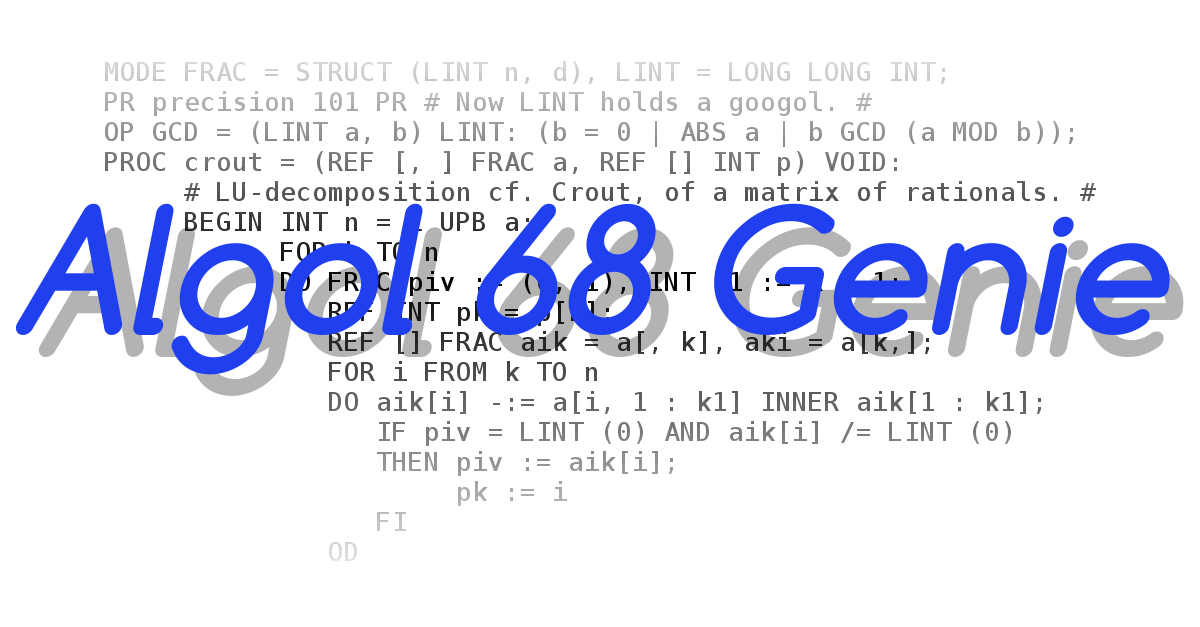a68g-conversion.c
1 //! @file a68g-conversion.c
2 //! @author J. Marcel van der Veer
3
4 //! @section Copyright
5 //!
6 //! This file is part of Algol68G - an Algol 68 compiler-interpreter.
7 //! Copyright 2001-2026 J. Marcel van der Veer [algol68g@xs4all.nl].
8
9 //! @section License
10 //!
11 //! This program is free software; you can redistribute it and/or modify it
12 //! under the terms of the GNU General Public License as published by the
13 //! Free Software Foundation; either version 3 of the License, or
14 //! (at your option) any later version.
15 //!
16 //! This program is distributed in the hope that it will be useful, but
17 //! WITHOUT ANY WARRANTY; without even the implied warranty of MERCHANTABILITY
18 //! or FITNESS FOR A PARTICULAR PURPOSE. See the GNU General Public License for
19 //! more details. You should have received a copy of the GNU General Public
20 //! License along with this program. If not, see [http://www.gnu.org/licenses/].
21
22 //! @section Synopsis
23 //!
24 //! Conversion tables for IEEE platforms.
25
26 #include "a68g.h"
27 #include "a68g-prelude.h"
28
29 // A list of 10 ^ 2 ^ n for conversion purposes on IEEE 754 platforms.
30
31 #if (A68G_LEVEL >= 3)
32
33 //! @brief 10 ** expo
34
35 DOUBLE_T ten_up_double (int expo)
36 {
37 static DOUBLE_T pow_10_double[] = {
38 10.0q, 100.0q, 1.0e4q, 1.0e8q, 1.0e16q, 1.0e32q, 1.0e64q, 1.0e128q, 1.0e256q, 1.0e512q, 1.0e1024q, 1.0e2048q, 1.0e4096q
39 };
40 // This appears sufficiently accurate.
41 if (expo == 0) {
42 return 1.0q;
43 }
44 BOOL_T neg_expo = (BOOL_T) (expo < 0);
45 if (neg_expo) {
46 expo = -expo;
47 }
48 if (expo > MAX_DOUBLE_EXPO) {
49 expo = 0;
50 errno = EDOM;
51 }
52 ABEND (expo > MAX_DOUBLE_EXPO, ERROR_INVALID_VALUE, NO_TEXT);
53 DOUBLE_T dbl_expo = 1.0q;
54 for (DOUBLE_T *dep = pow_10_double; expo != 0; expo >>= 1, dep++) {
55 if (expo & 0x1) {
56 dbl_expo *= *dep;
57 }
58 }
59 return neg_expo ? 1.0q / dbl_expo : dbl_expo;
60 }
61
62 #endif
63
64 //! @brief 10 ** expo
65
66 REAL_T ten_up (int expo)
67 {
68 static REAL_T pow_10[] = {
69 10.0, 100.0, 1.0e4, 1.0e8, 1.0e16, 1.0e32, 1.0e64, 1.0e128, 1.0e256
70 };
71 // This appears sufficiently accurate.
72 BOOL_T neg_expo = (BOOL_T) (expo < 0);
73 if (neg_expo) {
74 expo = -expo;
75 }
76 ABEND (expo > MAX_REAL_EXPO, ERROR_INVALID_VALUE, NO_TEXT);
77 REAL_T dbl_expo = 1.0;
78 for (REAL_T *dep = pow_10; expo != 0; expo >>= 1, dep++) {
79 if (expo & 0x1) {
80 dbl_expo *= *dep;
81 }
82 }
83 return neg_expo ? 1 / dbl_expo : dbl_expo;
84 }
|
© 2002-2026 J.M. van der Veer (jmvdveer@xs4all.nl)
|


